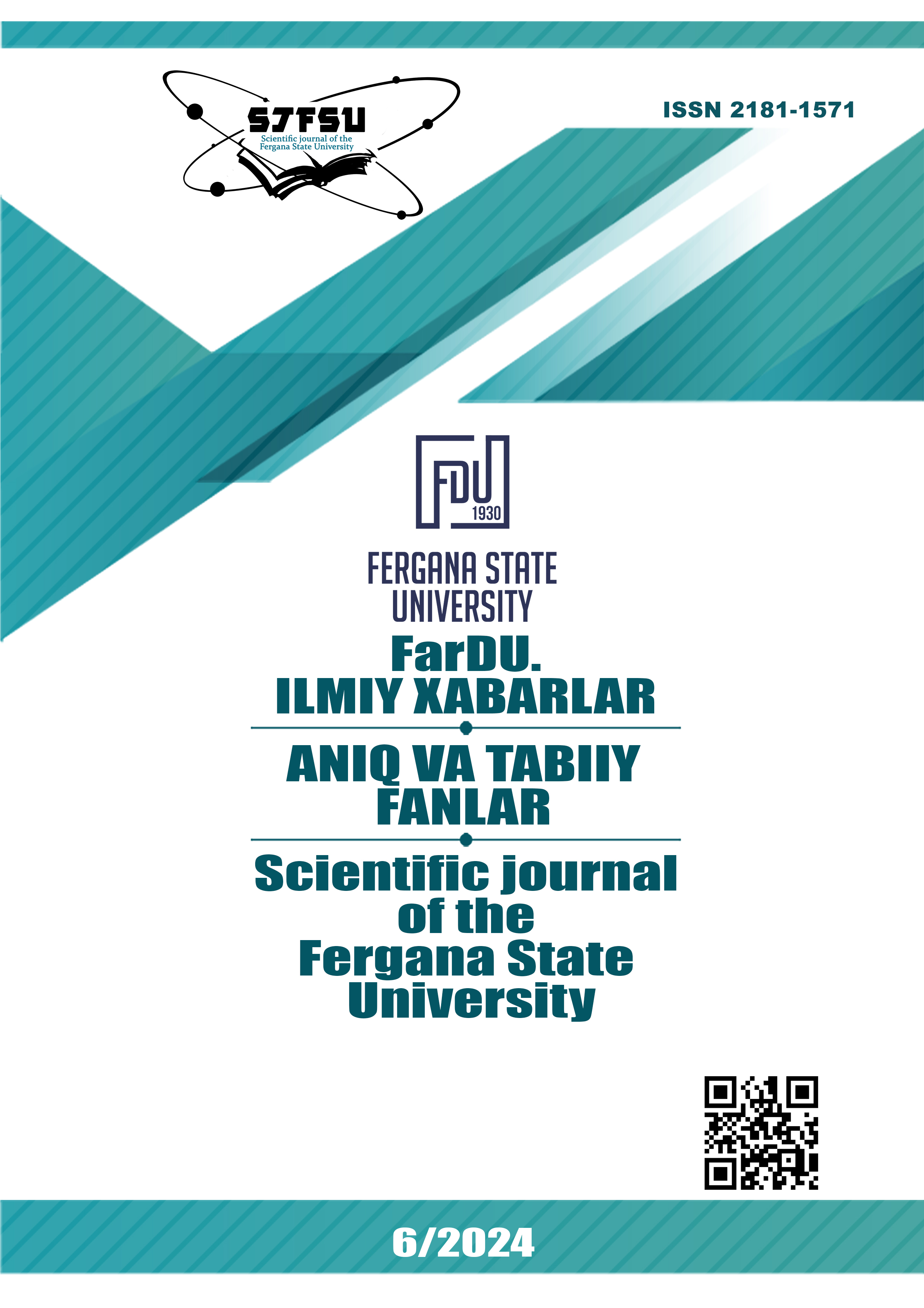THE INFLUENCE OF ECOLOGICAL FACTORS ON THE DEVELOPMENT OF SILKWORMS AND SILK YIELD
Keywords:
silkworm, sericulture, ecological factor, humidity, temperature, breed, yield, silkiness of silk.Abstract
This article studies the influence of ecological factors on the development of silkworms and silk yield by evaluating different breeds of silkworms under the same conditions. In assessing the breeds of silkworms, factors such as viability, the yield of live silk from 1 g of worms, the percentage of quality silk, the weight of one quality silk cocoon, the silkiness of live silk, and the composition of the cocoons were taken into account. In the experiment, 1 g of silkworms was taken from the breeds and fed in four repetitions, with 250 mg taken in each repetition. It was observed that the sharp changes in atmospheric air, namely light, humidity, and temperature, directly affect the development of silkworms and silk yield. The impact of ecological factors on the development of silkworms and the variation of key indicators across different variants are discussed. Information about the works of scientists in this field is also provided. The relatively dry climate and low humidity conditions of the Fergana region are recommended for breeding the Istiqbol breed in the districts of Toshloq, Yozyovon, Oltiariq, and Qo'qon, while the Uzbekistan-6 and Zarafshon breeds are recommended for the districts of Fergana, So'x, Quva, and Rishton, which have higher humidity.
References
Методика государственного сортоиспытания сельскохозяйственных культур. Москва 1983
Ergashev A. Umumiy ekologiya Toshkent, “Oʻzbekiston” 2003
Mirzaxodjaev M., Mirzaxodjaev B.,Umarov SH., Sodiqov D. Ipak qurtini choyshab ostida boqish soʻkichagini konstruktsiyasi va sinov natijalari . J. Oʻzbekiston qishloq va suv xoʻjaligi №2.-2019.-38 b.
Mahammadovna, A. D. (2023). ATROF-MUHIT MUHOFAZASIDA CHIQINDILAR MUAMMOSI VA UNING YECHIMI. Journal of new century innovations, 37(1), 194-198.
Ахмедова, Д. М. (2023). ВЗАИМОВЛИЯНИЕ ПИТАТЕЛЬНЫХ ВЕЩЕСТВ В ПОЧВЕННЫХ СРЕДАХ У ХЛОПЧАТНИКА. World of Science, 6(5), 6-12.
Ahmedova, D. (2023). EKOLOGIK DEHQONCHILIK VA UNING ISTIQBOLI. Science and innovation, 2(Special Issue 6), 133-136.
Ahmedova, D., & Turdimatova, H. S. (2022). PROBLEMS OF PRODUCTION OF ENVIRONMENTALLY FRIENDLY PRODUCTS. Journal of Academic Research and Trends in Educational Sciences, 1(12),12-16.
Akhmedova, D., & Nazarov, M. (2019). Influence of environmental factors on bio-ecological features and its productivity”.
Downloads
Published
Issue
Section
License
Copyright (c) 2025 Scientific journal of the Fergana State University

This work is licensed under a Creative Commons Attribution-NonCommercial-NoDerivatives 4.0 International License.
How to Cite
Most read articles by the same author(s)
- , , , ECOLOGICAL CHARACTERISTICS OF THE POND BIOCENOSIS , Scientific journal of the Fergana State University: No. 3 (2024): FarDU.Ilmiy xabarlar jurnali. Ilova to'plam (Aniq va tabiiy fanlar)
- , CONSTITUTIONAL FRAMEWORK FOR ENVIRONMENTAL RELATIONS , Scientific journal of the Fergana State University: No. 6- TOM (2023): SPECIAL ISSUE
- , , , DETERMINATION OF HEAVY METALS IN FOODS , Scientific journal of the Fergana State University: No. 2 (2023): Scientific journal of the Fergana State University (Exact and natural sciences)
- Dilfuza Yo‘ldosheva, MODERN PEDAGOGICAL METHODS OF DEVELOPING CREATIVE COMPETENCE OF FUTURE TEACHERS ON THE BASIS OF ACMEOLOGICAL APPROACH , Scientific journal of the Fergana State University: No. 1 (2023): Scientific journal of the Fergana State University (Social humanities sciences)
- , , , , , DEVELOPMENT AN EFFICIENT AND SELECTIVE OF DETECTION METHOD OF Fe (III) ION WITH AN IMMOBILIZED NITROSO-R-SALT , Scientific journal of the Fergana State University: No. 6 (2024): FarDU.Ilmiy xabarlar jurnali (Aniq va tabiiy fanlar)
- , PROVIDING GUARANTEES OF RELIABLE PROTECTION OF THE RIGHTS AND FREEDOMS OF HUMANS AND CITIZENS. IMPROVEMENT OF ADMINISTRATIVE, CRIMINAL AND CIVIL LEGISLATION , Scientific journal of the Fergana State University: No. 5 (2023): Scientific journal of the Fergana State University (Social humanities sciences)
- , , , , THE EFFECT OF BIOCHAR AND MINERAL FERTILIZERS ON MORPHOLOGICAL INDICATORS OF THE ROOT SYSTEM IN OKRA PLANT , Scientific journal of the Fergana State University: No. 2 (2024): FarDU.Ilmiy xabarlar jurnali (Aniq va tabiiy fanlar)
- , MODERN PEDAGOGICAL METHODS OF DEVELOPING CREATIVE COMPETENCE OF FUTURE TEACHERS ON THE BASIS OF ACMEOLOGICAL APPROACH , Scientific journal of the Fergana State University: No. 2 (2023): Scientific journal of the Fergana State University (Exact and natural sciences)
- Dilfuza Gaziyeva , THE ROLE OF THE MEDIA TEXT IN THE MODERN COMMUNICATIVE SPACE , Scientific journal of the Fergana State University: No. 4 (2023): FarDU ilmiy habarlari jurnali (Ijtimoiy gumanitar)
- , LEGAL BASIS OF POLITICAL PARTIES AND ITS OWN CHARACTERISTICS , Scientific journal of the Fergana State University: No. 4 (2024): Scientific journal of the Fergana State University (Social humanities sciences)

